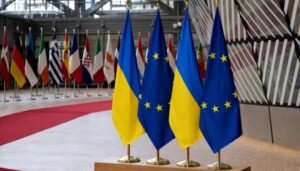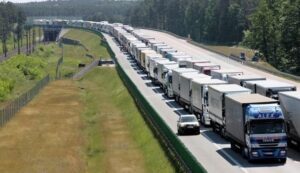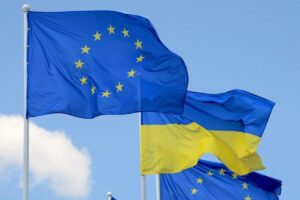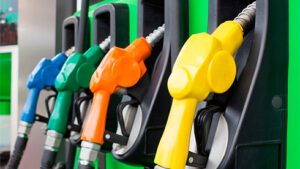
Ukraine-EU summit will take place on February 3, 2023 in Brussels.
Barend Leites, spokesman for European Council President Charles Michel, told the Interfax-Ukraine news agency in Brussels on Thursday.
“I can confirm that the Ukraine-EU summit will take place on February 3, there is an open invitation to President Zelensky to visit Brussels,” he said.

Associations uniting motor carriers of Lithuania and seven other European Union (EU) countries are calling for the problem of queues of trucks at the Ukraine-EU border to be solved, the Lithuanian national association of motor carriers Linava has said.
The association estimates that at present there is a queue of over 40 kilometers on the Ukrainian side at one of the border crossings between Romania and Ukraine, over 25 kilometers – on the Ukrainian-Hungarian border, and about 15 kilometers – on the Ukrainian-Slovak border.
Linava, together with the International Road Transport Union (IRU) and its members, has approached the European Commission (EC) with a proposal to introduce priority border crossing lines for International Road Transport (TIR), which would increase the number of trucks crossing the border into Ukraine by 2 to 3 times.
According to Linava Secretary General Zenon Buivydas, waiting for trucks at the Ukrainian border can take up to several days, which, he says, creates a number of problems for trucking firms and truckers alike.
The appeal to the EC and its President was signed by IRU President Radu Dinescu and Secretary General Umberto de Pretto, as well as Buividas and representatives of carriers from Moldova, Ukraine, Serbia, Slovakia, Latvia, Hungary, Turkey, Romania and Poland.

The EU-Ukraine Association Council is scheduled for September 5, said Josep Borrell, High Representative of the European Union for Foreign and Security Policy.
“We will continue to support Ukraine in advancing the reform agenda of its European perspective after Ukraine has been granted candidate status. We will hold an Association Council on September 5 after the summer break and we are working to ensure that this Council advances the European perspective for Ukraine through implementation of the necessary reforms,” he announced on Monday in Brussels at a press conference following the meeting of the EU Council at the level of foreign ministers.
Borrell confirmed that the ministers had unanimously approved his proposal for the next tranche from the European Peace Fund in the amount of 500 million euros, which will be formally decided in the coming days.
The High Representative stated that the EU is “terrified of the brutality of Russian aggression against the civilian population in Ukraine, the use of sexual violence as a weapon of war”, the Russians are “burning fields with grain”, “blocking food supplies” and “are responsible for world hunger” . “Russia is trying to destroy Ukraine and the Ukrainian nation, while at the same time unleashing the global food and energy crisis. Ministers agreed that we must continue to stand by Ukraine in its struggle for independence. Ukraine needs more weapons and we will supply them. We We will continue to support Ukraine,” he assured.
Borrell also said that work continues on sanctions for the Russian Federation. He also refuted claims that energy price increases were driven up by the EU’s ban on Russian oil. “Many say that the EU, by imposing sanctions, provoked a rise in prices. This is not true. The price of oil rose one month before the war, and after we banned the export of oil from Russia, the price of oil fell,” the High Representative stated. .

Ukraine, with the help of Western partners, has managed to significantly increase fuel imports from EU countries, as a result, in May the country will receive 350,000 tonnes of fuel via completely new logistics routes, the Ministry of Economy has said on its website.
“In March-April 2022, measures were introduced that made it possible to increase the daily volume of fuel imports from the EU from 4,000 tonnes to 12,000 tonnes per day,” the ministry said.
Among the measures taken that ensured such growth, the Ministry of Economy named the abolition of entry permits for tankers to deliver fuel to Ukraine, ensuring the ability to receive fuel in the ports of the Danube, adjusting the mechanism for price regulation of the cost of fuel and extraordinary clearance of fuel at the borders by customs and border guards.
“Thanks to this, five times more fuel was delivered to Ukraine by railroad. In March, 35,000 tonnes were delivered, in May we expect 180,000 tonnes. Imports by road increased 15 times – from 5,000 tonnes to 85,000 tonnes. Transportation by river now brings five times more fuel compared to March – from 4,000 to 22,000 tonnes,” First Deputy Prime Minister Yulia Svyrydenko, Minister of Economy, is quoted in the report.
According to the Ministry of Economy, there is also an agreement to start reversing fuel by pipe transport from Hungary: Ukraine received confirmation to import 35,000 tonnes per month, with a potential increase to 50,000 tonnes.
In addition, customs launched a separate green lane for fuel trucks from Poland, which will potentially increase the pass from 110 to 200 trucks per day.
“Today, the entire volume of imports can be directed to domestic consumption. Building up stocks requires more time. For queues and shortages to disappear, fuel supplies at filling stations are required for at least 15 days,” the ministry said.
Among the tasks for the near future, it named obtaining the consent of the EU countries for guaranteed acceptance of tankers with fuel for the Ukrainian market by their ports; the withdrawal of Russian and Belarusian fuel brought before the Russian invasion and now seized, the loading of the pipeline from Hungary with diesel, and the implementation of systemic purchases by NJSC Naftogaz Ukrainy.
“According to the updated forecast, consumption of 300,000 tonnes of diesel and 120,000 tonnes of gasoline is expected in May. Such a volume of imports has already been contracted by Ukrainian chains,” the ministry said.
At the same time, Svyrydenko said that attempts to sell fuel at prices above the maximum allowable – UAH 60, UAH 65 and even UAH 70 per liter – will be regarded “as looting.” “The government has given powers to regional military administrations to exercise control over price fixing. We will react harshly to such facts in accordance with wartime requirements,” the first deputy prime minister said.

The Common Aviation Area (CAA) agreement will be signed at the Ukraine-EU summit in Kyiv on Tuesday, October 12, a senior EU official has said.
He said at a briefing in Monday that three agreements will be signed at the summit. The first is the CAA agreement, which, in simple words, will improve communication between the two parties, and create conditions for new commercial opportunities for the airlines of Ukraine and the EU member states, he said.
According to him, the agreement will open Ukraine to some low-cost airlines, which will increase the number of travelers and will significantly contribute to the growth of the Ukrainian economy in the field of tourism.
Also, two more agreements will be signed: on the association of Ukraine with Horizon Europe, the European Framework Programme for research and innovation and with the Creative Europe programme.
The EU official said that the summit will provide an opportunity to discuss the results achieved in the implementation of the Ukraine-EU association agreement.
The review of the result will be launched at the summit and should be finalized next year. At the moment, the EU and Ukraine are exchanging respective assessments to present a common assessment at the bilateral summit in Brussels in 2022, he said.
The official said that the summit will provide an opportunity for the EU to reaffirm its continued commitment to strengthening Ukraine’s political association and economic integration with the EU.
It is vital that the EU continues to work closely with Ukraine to strengthen the rule of law and enhance and promote further reforms, he said. In this context, he touched on the particular importance of a comprehensive and consistent implementation of judicial reforms and the ongoing fight against corruption. Both of them are key, the official said.
In addition, he spoke about the EU’s plans to launch an investment package for Ukraine worth EUR 6.5 billion as part of the economic investment program.
He also said that the central theme at the summit will be security.
He said that he expects the leaders at the summit to reaffirm the EU’s commitment to implement and adhere to appropriate non-recognition policies, including restrictive measures. He said that there will also be a discussion about what we can do together to counter some of the hybrid threats and counter disinformation, which the EU and Ukraine often faces.
The official said that the summit will point out the need for the reform process in Ukraine to continue and be fully implemented. Further commitment is needed to ensure that the reform process becomes irreversible, especially in the area of the rule of law and the judiciary, he said.
The 23rd Ukraine-EU summit will take place on Tuesday, October 12, in Kyiv. It will start at 9.00. The EU will be represented at the summit by President of the European Council Charles Michel and President of the European Commission Ursula von der Leyen. Thus, Michel will visit Ukraine for the third time starting in March.

Head of the EU Delegation to Ukraine Matti Maasikas took part in a meeting of the Coordination Commission for the Implementation of the Association Agreement and discussed with members of the Cabinet of Ministers of Ukraine preparations for the Ukraine-EU summit scheduled for October 12.
“Very honoured to be invited to speak (the Ukrainian language) at the Ukrainian Cabinet’s Coordination Commission meeting on the implementation of our Association agreement. Preparations for the October 12 EU-Ukraine Summit, swift implementation of the justice reform, energy market issues discussed,” Maasikas wrote on Twitter on Wednesday.